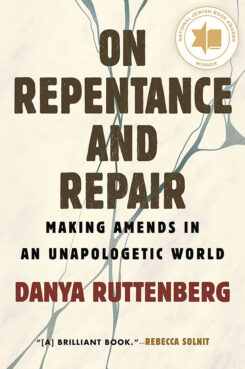
(RNS) — These days, there are many flavors of Jew hatred, from Robert F. Kennedy Jr.’s conspiracy theories about COVID-19 to medieval claims by Ye (formerly known as Kanye West) about Jews and money. But while offenses abound, sincere apologies seem difficult to come by.
On Friday (Aug. 4), actor Jamie Foxx evidently thought it would be funny to joke to his 16.7 million Instagram followers about Jews killing Jesus — a notion that has led to the death of millions of Jews — and to suggest that Jews were still #fakefriends who show #fakelove to the people they know. He quipped:
THEY KILLED THIS DUDE NAME JESUS… WHAT DO YOU THINK THEY’LL DO TO YOU???! #fakefriends #fakelove
Though it’s difficult to quantify how much this normalized anti-Jewish sentiments and actions, suffice it to say that millions of people heard from a celebrity just what he thought of the murderous capacity of an entire group of people.
The next day, he issued an apology:
I want to apologize to the Jewish community and everyone who was offended by my post. I now know my choice of words have caused offense and I’m sorry. That was never my intent. To clarify, I was betrayed by a fake friend and that’s what I meant with “they” not anything more. I only have love in my heart for everyone. I love and support the Jewish community. My deepest apologies to anyone who was offended. (Followed by three heart emojis)
There are many ways in which Foxx could have apologized that did not place the onus on the “Jewish community and everyone who was offended” by his post. There are ways in which he could have taken responsibility for his words — and the extent to which they inadvertently spread a deadly trope. Instead, he missed the opportunity to show leadership and character in understanding the impact of his words.
Cardi B did little better last week after sharing photos of Hasidic Jews with her 31 million X (formerly Twitter) followers, who readily connected them to her 2018 song lyrics, “Lawyer is a Jew, he gon’ chew up all the charges.”
Soon “Lawyer is a Jew” was trending, reinforcing stereotypes about chosen professions for Jews that date back to medieval Europe, when Jews were kept from owning land and had to revert to trades and businesses seen as distasteful or worthy of scorn by the Christian majority. The tweet was eventually removed, but without comment and without Cardi B’s directly addressing how the tweet had fomented antisemitic exchanges online.
Jewish tradition does not “cancel,” because when faced with attacks such as these the tradition focuses on an “accounting of the soul,” on humans’ personal responsibility to change and on efforts to remedy a negative situation of one’s making. This change is called t’shuvah, which literally means “return” or “repentance.” The aim is to grow as people.

“On Repentance and Repair: Making Amends in an Unapologetic World” by Danya Ruttenberg. Courtesy image
For more on this, Rabbi Danya Ruttenberg’s book “On Repentance and Repair: Making Amends in an Unapologetic World” unpacks the topic masterfully. But we can suggest here four immediate actions that should be part of a sincere apology for spreading anti-Jewish hate or amplifying antisemitic stereotypes, intentionally or otherwise:
- Listen with care and try to understand the impact that your words or actions have had on the American Jewish community. Both Foxx and Cardi B invoked tropes that ran far deeper than either artist acknowledged.
- Work to undo the damage. Artists, actors and other public figures have massive platforms. They should use them not simply to issue an apology, but to name the underlying tropes and explain why they are so harmful — and potentially dangerous — to Jews.
- The person who committed the wrong should explain the process of learning that they plan to engage in. They should speak of a commitment to study with a Jewish clergyperson or the leaders of the Jewish organization, a step Nick Cannon did after his own anti-Jewish remarks last year.
- The person must commit not to repeat the wrong. One of the challenges of Cardi B’s post is that it re-evoked earlier missteps. It showed a willingness to continue on a path without remorse or change.
Cardi B and Foxx, and every public figure, must do better when apologizing to the Jewish community, which faces too many genuine threats to be used as a foil for bad jokes. Thankfully, the Jewish community has a long-standing process for making amends and is able to support public figures in making positive change. We call on Foxx and Cardi B to engage in t’shuvah.
(Rabbi Joshua Stanton and Cantor Olivia Brodsky are co-clergy at East End Temple. Stanton also serves as director of leadership and formation at Clal. The views expressed in this commentary do not necessarily reflect those of Religion News Service.)
